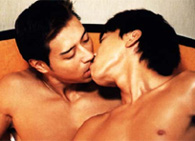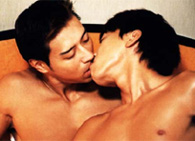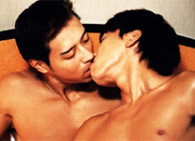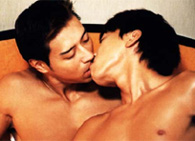Introduction
It's not everyday that we stumble upon some expert advice on dating (and no, your neighbor Marge doesn't count). With demanding jobs and hectic lives, most of us could use a little help. Clinical psychologist, Will Swift, Ph.D., draws on his years of experience counseling gay men to offer insightful hints to making (and keeping) a love connection.

When you approach an attractive stranger in a bar or social setting, what's the best opening line?
a. Do you come here often?
b. I almost didn't have the courage to talk to you
c. I like your shirt
d. You're the sexiest person in here
You may dislike all of these openers. Obviously you have to pick an approach that is comfortable for you. The consensus from ten years of dating workshops is that some form of compliment is the best approach. Most people who have trouble approaching others feel like they have to come out with a wonderful, articulate, funny opening. While "come here often?" is bland, it's better than standing in a corner feeling tense and disappointed in yourself. It's good to be genuine -- that makes things lively -- but you shouldn't make your approach sound like group therapy. If you make a good connection, you can reveal later how hard it was to make the introduction. If you are looking for sex, a sexual compliment may clarify things quickly, but it won't create the best atmosphere for getting to know someone. I prefer the simplest approach of all. With as friendly a smile as my nervous face can muster, I say: "Hi, my name is Will."
On a scale of 1 to 10, (with 10 being the highest), what is the ideal degree of physical chemistry you should have with someone you are dating?
a. six to eight is a good, healthy chemistry
b. the higher the better
c. five to six, so you can feel safe
d. at least a nine
When you're attracted to someone, the chemistry is usually based on both looks and personality. The higher the chemistry, the more likely it is that your insecurities and early childhood vulnerabilities will be triggered. A person who triggers these feelings is likely to have some of the negative characteristics of parents or others who caused you pain in childhood. For instance, if you have a sense of defectiveness (not feeling good enough), you may have high chemistry with someone who is critical of you, just like your father or mother was. In general, I recommend that people choose partners with a six to eight chemistry to provide an adequate mix of excitement and vulnerability.
If you choose someone for whom you feel too low a chemistry, you may become bored. The amount of chemistry that is reciprocated is also important. If s/he is a 10 for you and you are a 5 for him or her, you will probably feel unappreciated and unhappy. If you both are 10's for each other and neither of you feels defective, it might be an interesting ride, but fasten your seat belts!

a. Research has shown that gay couples within five years of each other have the best chance
b. Gay couples with a nine year or more age difference do the best
c. Couples about the same age fare better
d. There is no correlation between age difference and a successful relationship
Among the clients who see me for therapy, two of the most successful relationships are couples with big age differences. But most couples I have worked with have been much closer in age. Some psychologists suggest that a nine-year difference tends to minimize power struggles and competitiveness, but I don't know of research that suggests any particular age difference works best. For many years I had the idea that my ideal lover would be about the same age as me. Yet, I've had partners ten years older, ten years younger and the same age, and the match between our personalities and values always turned out to be more important than the age differences. I do have a slight prejudice, which I can overcome when necessary, that men in their mid-twenties may not be settled enough to make good matches with older guys in their forties and fifties.
I have met past boyfriends/girlfriends (dated six months or more):
a. Through friends
b. In a bar
c. On the street
d. Through a dating service
e. In a gay organization
In my therapy practice I've seen men who've met their partners through all of these avenues. Meeting someone through friends has the advantage of some pre-screening (unless the friend's philosophy is "they are both gay, so they're perfect for each other"). A possible problem is the feeling that you are dating in a fishbowl with progress reports requested on all sides. On the other hand, the pressure can be off when you meet someone through an organization. You can get to know the other guy naturally through sharing activities you both enjoy without having to make quick decisions about asking him out. Men you meet in the street or in a bar may be more focused on sex than dating, but there are always exceptions. The biggest initial objection to dating services is the idea that they are "for losers and the last resort for the desperate," but the truth is that the men who join up may be more seriously interested in and ready for a relationship. I have several friends who are very happily committed to partners they met through a dating service.
The First Date
What is the topic you should most avoid discussing on a first date?
a. Your HIV status
b. How you are feeling on the date
c. The ways a recent boyfriend hurt you
d. What you like to do in bed

Whenever I heard a dramatic and sad tale on a first date, my psychologist alarm signals would go off full blast -- indicating that my date wasn't available yet or he was so wounded that he would take far more than he could give. Some men like to have the HIV discussion on the first date with someone they like. If they have a strong preference to date a man of similar HIV status, they can be sure that they are compatible. While talking about what you like to do in bed is a way to get to know someone, it's a bit premature for a first date.
When you're excited about someone you just had a first date with and there seems to be a mutual interest, how long should you wait before giving him/her another call?
a. Leave him/her a message the next day to let him/her know you enjoyed the date
b. If you are not sure, wait for him/her to call you
c. Wait at least two or three days
d. Let a week pass
Sometimes there is no second date because both men/women are waiting for the other to show interest. It is good practice to put yourself on the line by calling. You can learn to move on quickly if the interest is not as mutual as you had hoped. If you have a pattern of scaring men off, you should probably set some firm guidelines for yourself. No matter how you feel, wait at least two or three days before calling again. However, if he/she treated you to dinner, it would make sense to leave a message thanking him/her for the meal, saying you had a good (not life-changing) time, and suggesting you speak later in the week. If being too enthusiastic too quickly is not an issue for you, you can probably trust your own intuition.
When dating someone, how should you handle dealing with HIV status?
a. Be clear about it on the first date
b. Make sure to discuss it before having sex
c. Have safer sex and talk about it only when things look like they might get more permanent
d. It doesn't really matter whether you discuss it as long as you are having safer sex

If you are dating someone with whom you want to develop intimacy, talking about HIV before sex can be part of building closeness. If you have sex before discussing HIV, a good question to ask yourself is whether you would have done anything differently during sex if you knew your partner's HIV status. If so, that might be a sign that you should talk about it first. In any case, keep having safer sex.
At the end of a first date, when you've decided you don't want to see the person again, what is the appropriate thing to say?
a. Thanks for getting together with me
b. Let's talk
c. The romantic chemistry didn't quite click
d. Good-night
At the end of a first date there is what I call "the moment of truth or not" where one or both parties give some signal as to whether there will be a second date. When I was single, I heard "let's talk" a couple times and was frustrated when I didn't hear from the guy again. "Let's talk" works as a quick way of ending the evening, but it's ultimately unkind if you have no intention of following through. "Good night" sounds a bit dismissive and abrupt to me although it does get the point across. Something simple and polite, like "nice to meet you" probably works best. It is more effective to show interest by saying something like "I would enjoy seeing you again. Give me a call if you would like to do that" rather than asking how your date felt. When the other person does put you on the spot by asking, you can say something like "the romantic chemistry didn't quite click." Most people don't want a big explanation about why you don't want to see them again. If you'd like to consider a friendship with the person you can let them know that you felt more of a "friendly chemistry" than a romantic one.
Editor's note: Part 2 of the article will be published next week.











 列印版本
列印版本











讀者回應
搶先發表第一個回應吧!
請先登入再使用此功能。